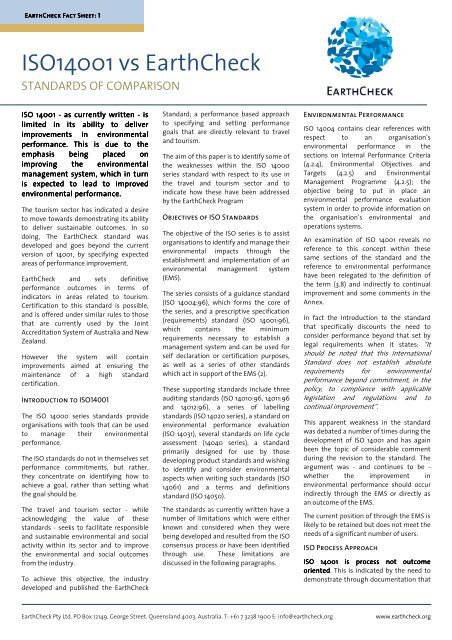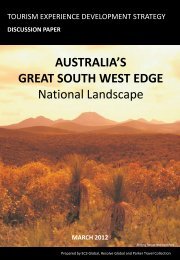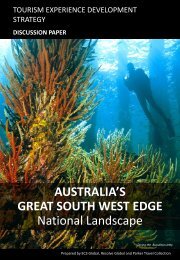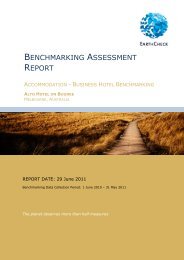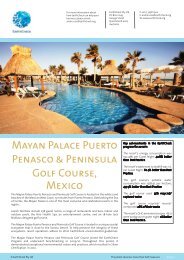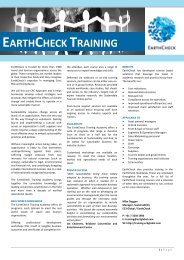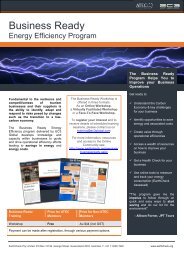ISO14001 vs EarthCheck
ISO14001 vs EarthCheck
ISO14001 vs EarthCheck
You also want an ePaper? Increase the reach of your titles
YUMPU automatically turns print PDFs into web optimized ePapers that Google loves.
<strong>EarthCheck</strong> Fact Sheet: 1<br />
<strong>ISO14001</strong> <strong>vs</strong> <strong>EarthCheck</strong><br />
STANDARDS OF COMPARISON<br />
ISO 14001 - as currently written - is<br />
limited in its ability to deliver<br />
improvements in environmental<br />
performance. This is due to the<br />
emphasis being placed on<br />
improving the environmental<br />
management system, which in turn<br />
is expected to lead to improved<br />
environmental performance.<br />
The tourism sector has indicated a desire<br />
to move towards demonstrating its ability<br />
to deliver sustainable outcomes. In so<br />
doing, The <strong>EarthCheck</strong> standard was<br />
developed and goes beyond the current<br />
version of 14001, by specifying expected<br />
areas of performance improvement.<br />
<strong>EarthCheck</strong> and sets definitive<br />
performance outcomes in terms of<br />
indicators in areas related to tourism.<br />
Certification to this standard is possible,<br />
and is offered under similar rules to those<br />
that are currently used by the Joint<br />
Accreditation System of Australia and New<br />
Zealand.<br />
However the system will contain<br />
improvements aimed at ensuring the<br />
maintenance of a high standard<br />
certification.<br />
Introduction to <strong>ISO14001</strong><br />
The ISO 14000 series standards provide<br />
organisations with tools that can be used<br />
to manage their environmental<br />
performance.<br />
The ISO standards do not in themselves set<br />
performance commitments, but rather,<br />
they concentrate on identifying how to<br />
achieve a goal, rather than setting what<br />
the goal should be.<br />
The travel and tourism sector - while<br />
acknowledging the value of these<br />
standards - seeks to facilitate responsible<br />
and sustainable environmental and social<br />
activity within its sector and to improve<br />
the environmental and social outcomes<br />
from the industry.<br />
To achieve this objective, the industry<br />
developed and published the <strong>EarthCheck</strong><br />
Standard; a performance based approach<br />
to specifying and setting performance<br />
goals that are directly relevant to travel<br />
and tourism.<br />
The aim of this paper is to identify some of<br />
the weaknesses within the ISO 14000<br />
series standard with respect to its use in<br />
the travel and tourism sector and to<br />
indicate how these have been addressed<br />
by the <strong>EarthCheck</strong> Program<br />
Objectives of ISO Standards<br />
The objective of the ISO series is to assist<br />
organisations to identify and manage their<br />
environmental impacts through the<br />
establishment and implementation of an<br />
environmental management system<br />
(EMS).<br />
The series consists of a guidance standard<br />
(ISO 14004:96), which forms the core of<br />
the series, and a prescriptive specification<br />
(requirements) standard (ISO 14001:96),<br />
which contains the minimum<br />
requirements necessary to establish a<br />
management system and can be used for<br />
self declaration or certification purposes,<br />
as well as a series of other standards<br />
which act in support of the EMS (2).<br />
These supporting standards include three<br />
auditing standards (ISO 14010:96, 14011:96<br />
and 14012:96), a series of labelling<br />
standards (ISO 14020 series), a standard on<br />
environmental performance evaluation<br />
(ISO 14031), several standards on life cycle<br />
assessment (14040 series), a standard<br />
primarily designed for use by those<br />
developing product standards and wishing<br />
to identify and consider environmental<br />
aspects when writing such standards (ISO<br />
14061) and a terms and definitions<br />
standard (ISO 14050).<br />
The standards as currently written have a<br />
number of limitations which were either<br />
known and considered when they were<br />
being developed and resulted from the ISO<br />
consensus process or have been identified<br />
through use. These limitations are<br />
discussed in the following paragraphs.<br />
Environmental Performance<br />
ISO 14004 contains clear references with<br />
respect to an organisation’s<br />
environmental performance in the<br />
sections on Internal Performance Criteria<br />
(4.2.4), Environmental Objectives and<br />
Targets (4.2.5) and Environmental<br />
Management Programme (4.2.5); the<br />
objective being to put in place an<br />
environmental performance evaluation<br />
system in order to provide information on<br />
the organisation’s environmental and<br />
operations systems.<br />
An examination of ISO 14001 reveals no<br />
reference to this concept within these<br />
same sections of the standard and the<br />
reference to environmental performance<br />
have been relegated to the definition of<br />
the term (3.8) and indirectly to continual<br />
improvement and some comments in the<br />
Annex.<br />
In fact the Introduction to the standard<br />
that specifically discounts the need to<br />
consider performance beyond that set by<br />
legal requirements when it states: “It<br />
should be noted that this International<br />
Standard does not establish absolute<br />
requirements for environmental<br />
performance beyond commitment, in the<br />
policy, to compliance with applicable<br />
legislation and regulations and to<br />
continual improvement”.<br />
This apparent weakness in the standard<br />
was debated a number of times during the<br />
development of ISO 14001 and has again<br />
been the topic of considerable comment<br />
during the revision to the standard. The<br />
argument was - and continues to be -<br />
whether the improvement in<br />
environmental performance should occur<br />
indirectly through the EMS or directly as<br />
an outcome of the EMS.<br />
The current position of through the EMS is<br />
likely to be retained but does not meet the<br />
needs of a significant number of users.<br />
ISO Process Approach<br />
ISO 14001 is process not outcome<br />
ome<br />
oriented. This is indicated by the need to<br />
demonstrate through documentation that<br />
<strong>EarthCheck</strong> Pty Ltd. PO Box 12149. George Street. Queensland 4003. Australia. T: +61 7 3238 1900 E: info@earthcheck.org<br />
www.earthcheck.org
Improving efficiency and<br />
reducing emissions<br />
the process is effective. It is also<br />
demonstrated by the absence in the<br />
requirement for EMS audits to consider<br />
performance outcomes either indirectly or<br />
directly, the need to keep performance<br />
records in the Records (4.5.3) section of the<br />
standard or to consider performance in the<br />
management review process other than in<br />
terms of continual improvement.<br />
Communication and consultation<br />
Another issue of significance identified in<br />
14004 but not fully carried over into 14001<br />
is that associated with the interested<br />
parties.<br />
ISO 14004 indicates that the views of<br />
interested parties (individual or group<br />
concerned with or effected by the<br />
environmental performance of an<br />
organisation) should be considered in<br />
developing an organisations<br />
environmental policy, assessing<br />
significance, setting objectives and<br />
targets, providing capabilities and support,<br />
communicating and reporting and in the<br />
conduct of management reviews.<br />
In ISO 14001 the reference to interested<br />
parties is limited to specific requirements<br />
in setting an organisation’s objectives and<br />
targets and in considering external<br />
communications.<br />
Early Experimentation<br />
Since the United Nations Earth Summit in<br />
Rio de Janeiro in 1992 and the<br />
promulgation of Agenda 21, the Travel &<br />
Tourism industry has been striving to<br />
improve their environmental performance<br />
and deliver environmentally sustainable<br />
outcomes.<br />
Operational practices are being adjusted<br />
to help clean environments, reduce solid<br />
waste, reduce energy consumption,<br />
improve local economies, and measure<br />
triple bottom line results.<br />
They are benchmarking the performance<br />
with their environmental improvement<br />
actions, and seeking recognition for such<br />
achievements.<br />
To gain recognition for these<br />
achievements the World Travel and<br />
Tourism Council (WTTC) developed and<br />
launched a tourism specific program in<br />
1993. Originally entitled Green Globe, the<br />
scheme set standards and required only<br />
membership to obtain the Green Globe<br />
logo.<br />
Then, in 1996 the WTTC, World Tourism<br />
Organisation and the Earth Council<br />
developed Agenda 21 for the Travel &<br />
Tourism Industry.<br />
Set against Agenda 21 principles and goals,<br />
it recognised the potential of Travel &<br />
Tourism - as the world’s largest civil<br />
industry - to make a significant, high<br />
profile contribution to a sustainable planet<br />
and the reduction of global greenhouse<br />
gas emissions.<br />
Agenda 21 for Travel & Tourism<br />
documented the following principles to<br />
guide the Travel & Tourism industry<br />
towards more sustainable development<br />
outcomes:<br />
• Travel & Tourism should assist people<br />
in leading healthy and productive<br />
lives in harmony with nature;<br />
• Travel & Tourism should contribute to<br />
the conservation, protection, and<br />
restoration of the Earth’s ecosystem;<br />
• Travel & Tourism should be based<br />
upon sustainable patterns of<br />
production and consumption;<br />
• Nations should cooperate to promote<br />
an open economic system, in which<br />
international trade in Travel &<br />
Tourism services can take place on a<br />
sustainable basis;<br />
• Travel & Tourism, peace,<br />
development, and environmental<br />
protection are interdependent;<br />
• Protectionism in trade in Travel &<br />
Tourism services should be halted or<br />
reversed;<br />
• Environmental protection should<br />
constitute an integral part of the<br />
tourism development process;<br />
• Tourism development issues should<br />
be handled with the participation of<br />
concerned citizens, with planning<br />
decisions being adopted at local level;<br />
• Nations shall warn one another of<br />
natural disasters that could affect<br />
tourists or tourist areas;<br />
• Travel & Tourism should use its<br />
capacity to create employment for<br />
women and indigenous peoples;<br />
• International laws protecting the<br />
environment should be respected by<br />
the Travel & Tourism industry.<br />
By 1999 it was becoming apparent that the<br />
Green Globe program was in need of<br />
additional rigour and it was decided to<br />
offer a certification process for travel and<br />
tourism organisations who wished to<br />
demonstrate their commitment to Agenda<br />
21.<br />
This involved a revision to the Green<br />
Globe21 (GG21) standard and the inclusion<br />
of a process for independent auditing (3).<br />
By the end of 2000 it was again becoming<br />
obvious that the process approach to<br />
environmental performance adopted in<br />
the 1999 standard was unable to meet the<br />
needs of the travel and tourism industry.<br />
A further revision to the standard placed<br />
the emphasis on environmental<br />
performance outcomes; rather than the<br />
process of achieving such outcomes was<br />
needed.<br />
An Evolving Standard<br />
The April 2001 revision to GG21 provided a<br />
framework for what would become known<br />
as <strong>EarthCheck</strong>; the next generation in<br />
environmental management programs.<br />
Achieving year-on-year improvements in<br />
relevant key performance areas, this<br />
resulted in overall improvements in<br />
environmental performance. The<br />
framework addressed:<br />
Environmental and Social<br />
Sustainability Policy. This section of<br />
the standard seeks to obtain the<br />
organisations commitment to the<br />
concept of environmental and social<br />
sustainability through the<br />
development of a written policy.<br />
<br />
Regulatory framework. This section<br />
of the standard requires the<br />
identification of relevant<br />
environmental, public and<br />
occupational health and safety,<br />
hygiene, employment and other<br />
legislation applicable to the<br />
organisations operations.<br />
Environmental and Social<br />
Sustainability Performance. This<br />
section of the standard specifies the<br />
areas in which environmental and<br />
social sustainability performance<br />
must be demonstrated.<br />
Environmental<br />
Management<br />
System. This section of the standard<br />
outlines the framework for an EMS<br />
that will enable delivery of the<br />
performance outcomes in the areas<br />
specified in Section 3.<br />
Stakeholder Consultation and<br />
Communication. This section of the<br />
<strong>EarthCheck</strong> Pty Ltd. PO Box 12149. George Street. Queensland 4003. Australia. T: +61 7 3238 1900 E:info@ec3global.com<br />
www.earthcheck.org
Improving efficiency and<br />
reducing emissions<br />
standard specifies the requirements<br />
for stakeholder consultation and<br />
communication.<br />
Shortcomings & Differences<br />
In developing GG21, consideration was<br />
given to ISO 14001 shortcomings and some<br />
additional impacts specific to the travel<br />
and tourism sector, which would need to<br />
be addressed if the sectors goals<br />
concerning sustainability were to be<br />
achieved. These shortfalls can be<br />
summarized as follows:<br />
An absence of links with Agenda 21<br />
and sustainable outcomes;<br />
An emphasis on legal requirements as<br />
a basis for performance;<br />
Limited involvement of interested<br />
parties (stakeholders) in the setting of<br />
performance outcomes ;<br />
A focus on process rather than on<br />
actual outcomes; and<br />
Perceived application of the standard<br />
to industrial rather than service sectors.<br />
Agenda 21 and <strong>EarthCheck</strong><br />
Although ISO 14001 mentions the concept<br />
of sustainable development in its<br />
introduction, the standard itself is largely<br />
directed towards assisting organisations<br />
to demonstrate and improve upon legal<br />
compliance and makes little attempt to<br />
address the issue of sustainability.<br />
While it can be argued that legal<br />
compliance may represent the minimum<br />
that is sustainable this may only be so in<br />
jurisdictions where the understanding of<br />
the concept is well advanced, such as in<br />
parts of the EU.<br />
In lesser developed areas of the world,<br />
which frequently support a large tourist<br />
population, even the concept of<br />
environmental protection has yet to be<br />
understood.<br />
Today, <strong>EarthCheck</strong> introduces the concept<br />
of sustainable development in a practical<br />
way. It does so by asking organisations to<br />
relate sustainability to such issues as the<br />
employment of persons living in nearby<br />
communities during both construction<br />
and ongoing operations.<br />
This gives preference to products and<br />
services of local origin, which do not<br />
adversely affect the operations activity,<br />
viability and environmental and social<br />
impacts. It also requires organisations<br />
make available their sustainability policy<br />
to all stakeholders including the general<br />
public.<br />
Performance Driven Outcomes<br />
The major difference between ISO 14001<br />
and <strong>EarthCheck</strong> lies in the change in<br />
emphasis from one of the demonstration<br />
of legal compliance to the<br />
demonstration of a nominated sector<br />
specific performance outcome<br />
o<br />
utcome.<br />
<strong>EarthCheck</strong> categorises those<br />
environmental, social and economic<br />
concerns likely to result from travel and<br />
tourism sector activities, as indicated<br />
below and deals with them in a separate<br />
section of the standard.<br />
Greenhouse gas emissions<br />
Energy efficiency, conservation and<br />
management;<br />
Management of freshwater<br />
resources;<br />
Ecosystem conservation and<br />
management;<br />
Management of social and cultural<br />
issues;<br />
Land use planning and management;<br />
Air quality protection and noise<br />
control;<br />
Waste water management;<br />
Waste minimisation, reuse and<br />
recycling;<br />
Storage and use of environmentally<br />
harmful substances.<br />
It requires organisations to meet specified<br />
performance requirements relevant to<br />
their operations that are identified in a<br />
series of 10 required sector performance<br />
guides and to improve upon this<br />
performance on an annual basis.<br />
Only organisations that are able to<br />
demonstrate they have meet the specified<br />
performance criteria for a minimum<br />
period of 12 months are allowed to claim<br />
compliance with the internationally<br />
recognised <strong>EarthCheck</strong> Standards and<br />
achieve <strong>EarthCheck</strong> Certification.<br />
Stakeholders<br />
Consultation with an organisation’s<br />
interested parties is limited within ISO<br />
14001 to issues associated with setting<br />
objectives and targets. Responding to<br />
external communications is generally<br />
reactive in nature.<br />
However the need to communicate and<br />
consult with an organisation’s<br />
stakeholders proactively is paramount to<br />
the travel and tourism industry.<br />
<strong>EarthCheck</strong> deals with this issue by<br />
allocating a separate section of the<br />
standard to consultation and<br />
communication and requires that the<br />
organisation actively encourages<br />
customers and suppliers to engage in the<br />
operation’s environmental and social<br />
programmes.<br />
Process versus outcome<br />
ISO 14001 is a process standard like its<br />
sister quality standard ISO 9001.<br />
Its strength, if correctly developed and<br />
implemented lies in its ability to deliver a<br />
consistent outcome as set down in the<br />
organisations policy.<br />
The absence of any reference to examining<br />
performance outcomes in the<br />
management review process is, as stated<br />
earlier, clear evidence of its intent.<br />
<strong>EarthCheck</strong> recognises that a consistent<br />
outcome is necessary and facilitates this<br />
by requiring the development of an EMS<br />
but unlike ISO 14001 the EMS is seen as<br />
only a method by which this is achieved<br />
not as an achievement in itself.<br />
Thus the rigour of the organisation’s EMS<br />
is not seen as the primary objective as is<br />
the case in ISO 14001 but merely as a tool<br />
to be used to achieve a performance<br />
outcome.<br />
Service Sector Application<br />
ISO 14001 - like its sister standard ISO 9001<br />
- is perceived as having a strong industrial<br />
focus as evidenced by the use of terms<br />
such as product, prevention of pollution,<br />
goods, calibration of monitoring<br />
equipment etc.<br />
<strong>EarthCheck</strong> has been designed to meet the<br />
specific needs of the travel and tourism<br />
industry through the development of<br />
sector-specific performance guides, which<br />
address issues relevant to that sector.<br />
Future Developments<br />
<strong>EarthCheck</strong> is not without its critics. They<br />
suggest that the Program is confusing,<br />
that the pass/fail approach offers little or<br />
no incentive for organisations to make real<br />
<strong>EarthCheck</strong> Pty Ltd. PO Box 12149. George Street. Queensland 4003. Australia. T: +61 7 3238 1900 E:info@ec3global.com<br />
www.earthcheck.org
Improving efficiency and<br />
reducing emissions<br />
improvements, the programme is too<br />
ambitious in its global reach, and that<br />
there is a legacy of left over logos issued<br />
under the earlier Green Globe scheme,<br />
which may confuse the user and reduce its<br />
value.<br />
Both the standard and the scheme are<br />
subject to ongoing improvement and - as<br />
experienced in early 2010 - changes<br />
continue to be made to strengthen the<br />
science that underpins the program, add<br />
user friendly tools and resources, and<br />
strengthen the brand proposition with<br />
both trade and consumers.<br />
Accreditation/certification<br />
Certification is a means by which an<br />
organization is able to demonstrate in the<br />
public domain its commitment to<br />
particular issues such as product and/or<br />
service quality, the environment and/or<br />
occupational health and safety etc.<br />
Certification relies on the credibility of the<br />
process, the competence of the auditors<br />
and the independence of the certification<br />
body. Increasing evidence in the market<br />
place indicates that the standard of<br />
certification in general is falling to a level<br />
of mediocrity and being increasingly<br />
driven by business needs at the expense of<br />
integrity and ethics.<br />
To overcome this problem the sector<br />
developed its own performance oriented<br />
standard <strong>EarthCheck</strong>, which when used<br />
with the appropriate sector guide,<br />
provides organizations working within the<br />
industry with improved environmental<br />
and social outcomes.<br />
References<br />
1. Global Green Standards ISO 14000<br />
and Sustainable Development,<br />
International Institute for Sustainable<br />
Development, Canada, 1996.<br />
2. ISO 14004:96 Environmental<br />
Management Systems: General<br />
guidelines on principles, systems and<br />
supporting techniques and ISO<br />
14001:96 Environmental<br />
Management Systems: Specification<br />
with guidance for use<br />
3. Green Globe 21Standard for Travel and<br />
Tourism:2001, Green Globe Ltd, UK<br />
4. Protecting Paradise: Certification<br />
Programs for Sustainable Tourism and<br />
Ecotourism, Institute for Policy<br />
Studies, USA, 2001.<br />
Examples include certification bodies that<br />
offer consultancy services through local<br />
associates or sister companies located<br />
overseas, unaccredited certification or<br />
certification to their own standard but<br />
without making the client aware of the<br />
implications of using this service, provide<br />
extensive training to the point where this<br />
is de facto consultancy and conduct an<br />
excessive number of pre-assessments.<br />
Conclusion<br />
While ISO 14001 has a significant role to<br />
play in assisting organizations to meet and<br />
demonstrate in the public domain their<br />
commitment to the environment, it may<br />
be interpreted strictly as limiting the<br />
organisations performance to that related<br />
to legal compliance.<br />
Such a limitation is unacceptable to the<br />
travel and tourism industry, which is<br />
committed to a sustainable approach to its<br />
activities.<br />
<strong>EarthCheck</strong> Pty Ltd. PO Box 12149. George Street. Queensland 4003. Australia. T: +61 7 3238 1900 E:info@ec3global.com<br />
www.earthcheck.org


